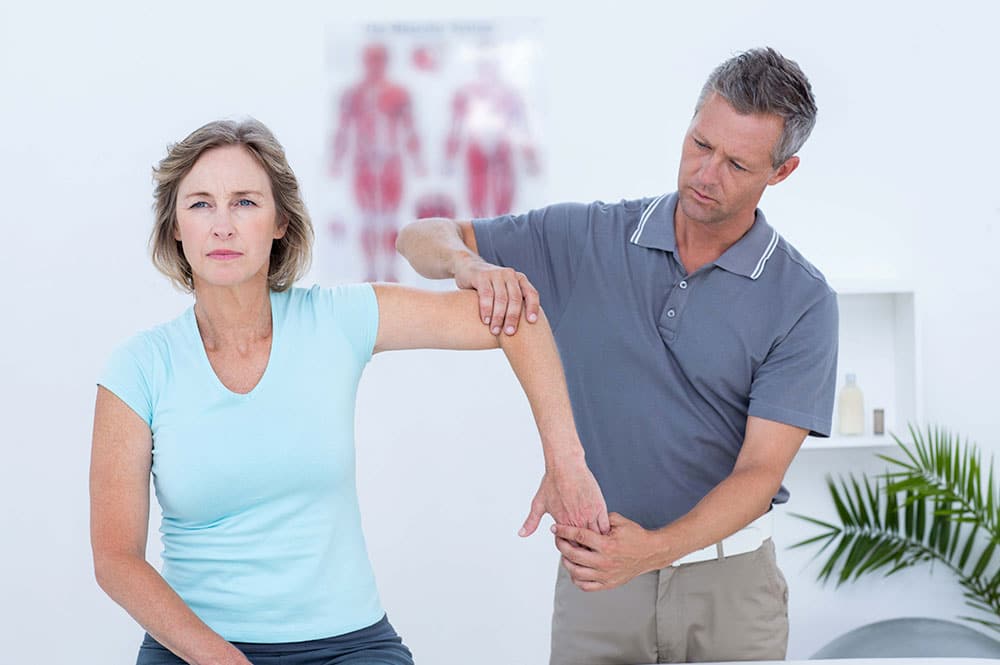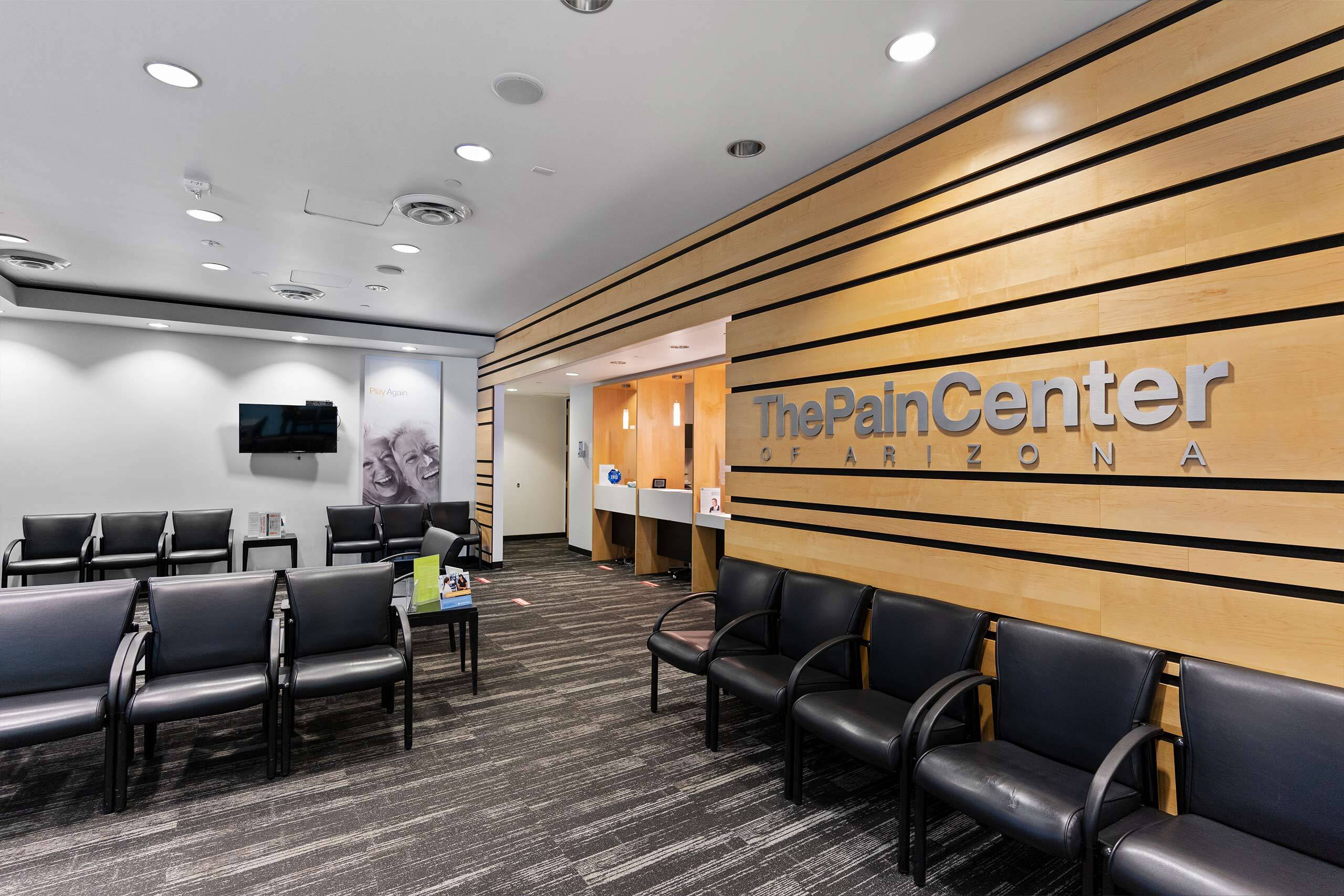Arm Pain Relief
Are you looking for arm pain relief?
Arm pain may develop from abnormalities or injury to the bones, skin, nerves, joints, or blood vessels. Natural wear and tear, overuse, trauma, or underlying conditions can also cause arm pain. Any part of the arm may be affected, including the lower arm, upper arm, joints, or shoulder. You may experience pain in the short term or long term, depending on the cause and severity. Arm pain may be described as mild to severe, and can occur in one or both arms. Depending upon the cause of your arm pain, you may experience discomfort while you are active or while you are at rest.
At The Pain Center, we can help diagnose the cause of your arm pain. We offer a range of therapies to treat your pain symptoms. Our goal is to get you back to your normal activities. Contact us to set up an appointment with one of our pain specialists.

Causes of Arm Pain
What can cause chronic arm pain and how can you find relief? The answer depends on the underlying condition. Causes of severe arm pain can include conditions, such as:
- Exercise or overuse (muscle aches)
- Repetitive joint use (bursitis or joint inflammation)
- Bone fractures
- Joint dislocations
- Peripheral vascular disease
- Muscle, ligament or tendon strains (tendinitis) or sprains
- Fibromyalgia
- Skeletal structure irregularities
- Arthritis
- Cardiac disorders or heart attack (angina)
- Angina pectoris that radiates to the arm
- Nerve damage
- Spine conditions such as cervical disk herniation
- Diabetic neuropathy
- Osteoporosis
- Infection
- Carpel tunnel syndrome
- Rotator cuff injury
- Other underlying conditions

Arm Pain Symptoms and Diagnosis
Be sure to inform your doctor of all your symptoms. Arm pain symptoms may include:
- Pain in the wrist, elbow or shoulder
- Arm weakness
- Pain in one or both arms
- Upper arm pain
- Sudden arm pain in the right arm
- Redness or discoloration of the skin on the arm
- Swelling of the arm, wrist, or elbow
- Stiffness in the joints
- Arm skin that is warm to the touch
- Itching or throbbing skin
- Pain that worsens when exercising
- Numbness or tingling
- Muscle pain / muscle aches
- Tenderness
- Reduced range of motion
- Muscle cramps / sore arm
To diagnose the cause of your pain, your doctor will ask you questions about your health and family history, and do a physical examination. Other tests that can help diagnose the source of your pain include X-rays, MRI scan, CT scan, EMG/Nerve conduction studyand blood tests. It is important that your condition is properly diagnosed so that you can receive the most effective treatment.

How to Treat Arm Pain
How can you ease the discomfort of arm pain symptoms? Your treatment options depend on the underlying cause and severity of your arm pain.
Treatment may start with conservative therapies, such as over-the-counter aspirin, acetaminophen or ibuprofen. These nonprescription medications can be effective for certain types of arm pain when taken according to instructions. You may also consider home care such as drinking plenty of water to reduce muscle cramps. Stretching and massage can help. You may also try using heating or cold packs, taking warm baths or showers, and resting your arms. Elevate your arm(s) when you lie down. Compression bandaging can help reduce swelling.
The pain management specialists at The Pain Center may also recommend the following interventional pain therapies to reduce your arm pain:
- Prescription medications/medication management
- Topical agents (creams)
- Injections such as steroid medications
- Spinal Cord Stimulator
- Physical therapy (can include exercises, heat and cold therapy, and electrical nerve stimulation-TENS unit)
- Alternative treatments such as acupuncture, chiropractic adjustments and/or massage
Some of the interventional medical therapies we provide at The Pain Center include:
Medication Management
Our pain specialists can prescribe and regulate medication that you use to help control your pain. The pain management specialists will provide you with the knowledge you need to take your medications properly.
The Pain Center takes a conservative approach with medication management. We try to limit prescription medications to help avoid dependence.
Steroid Injections
One option for treating pain is injection of a steroid that can help reduce pain and inflammation. This can be very effective for arthritis, rheumatoid arthritis, and osteoarthritis.
Nerve Blocks
A nerve block is an injection therapy that reduces pain caused by nerves. This can help treat arm pain, radicular pain and/or peripheral neuropathy. This procedure injects a combination of local anesthetic agents around the peripheral nerve branches for optimal pain relief. Peripheral nerve blocks provide relief that lasts from a few weeks to a few months, depending upon the patient’s condition.
Spinal Cord Stimulation
Spinal cord stimulation is an FDA-approved, minimally invasive procedure that requires the implantation of a nerve stimulation device. This treatment delivers low-voltage electrical currents to areas of the spine, ultimately reducing pain signals caused by chronic pain in the arm(s). Patients living with chronic pain, who have not responded to conservative treatments for at least six months, may be candidates for this procedure. A trial device is implanted before a permanent device is considered.

When Further Arm Pain Treatment is Required
Based on the underlying condition, further treatments may be required. If there is something that can be addressed by another type of specialist, we will refer you to the appropriate specialty doctor.
Commonly Asked Questions about Arm Pain
What are the best home remedies for arm pain relief?
There are many therapies you can use at home to help with arm pain, such as over-the-counter pain relievers (use as directed), rest, massage, elevation of the arm(s), cold or hot packs, and careful stretching.
I have been having neck problems. Could my arm pain be related to my neck?
It is possible for neck problems to cause pain in the arms. Sometimes, disc protrusion/herniation or degenerative changes in the cervical spine can cause pain that radiates out to the arm or hand.
I don’t have underlying conditions that could cause arm pain. What else could cause my symptoms?
Arm pain can be caused by overuse, anatomic abnormalities, or traumatic injuries such as falls. Your pain specialist can help determine the cause of your arm pain.
How can I relieve arm pain caused by overuse or strain?
Consider some of the following steps for relieving arm pain due to overuse or strain:
- Rest your arm
- Apply ice
- Switch to heat (after 48 hours)
- Gentle stretching
- Over-the-counter pain relief
- Massage
- Compression wrap or brace
- Adjust ergonomics of your work desk or hobbies
- Stay hydrated and eat well
When should I see a doctor for arm pain?
Consider contacting your trusted healthcare professional for your arm pain if you’re experiencing the following:
- Persistent pain
- Severe or sudden pain
- Numbness or tingling
- Swelling or redness
- Loss of movement
- Deformity
- Pain at night
- Fever
- Unexplained weight loss
- Fatigue
- Potential injury
Can arm pain be a sign of something serious like a heart attack?
Key signs that arm pain might be heart-related:
- Paired with Chest Symptoms: Pressure, tightness, or burning in the chest alongside arm pain is a red flag.
- Other Warning Signs: Shortness of breath, nausea, sweating, dizziness, or jaw/neck pain often accompany it.
- Sudden Onset: Heart attack pain typically starts abruptly and doesn’t tie to an obvious injury or strain.
- Worsens with Activity: If the pain intensifies with exertion and eases with rest, it’s more suspicious.


Get the care you need within 24 hours*
We know when you’re looking for relief for your chronic pain, you can’t wait any longer than you already have. This is why we can schedule you with an appointment within 24 hours at most of our pain centers across the Valley, so you can start your journey to life-long pain relief as soon as tomorrow.



